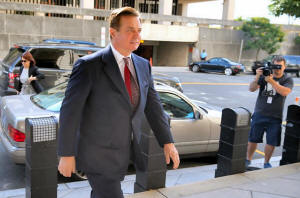|
Trump defends ex-aide Manafort as jury
ends second day of deliberations
 Send a link to a friend
Send a link to a friend
 [August 18, 2018]
By Nathan Layne and Karen Freifeld [August 18, 2018]
By Nathan Layne and Karen Freifeld
ALEXANDRIA, Va. (Reuters) - In a break with
convention, President Donald Trump weighed in on a criminal trial as the
jury considered a verdict on Friday, calling the tax and bank fraud case
against Paul Manafort "very sad" and lauding his former campaign
chairman as a "very good person."
A federal court jury in Alexandria, Virginia completed its second day of
deliberations without reaching a verdict in the first trial stemming
from Special Counsel Robert Mueller's 15-month-old investigation of
Russia's role in the 2016 U.S. election.
U.S. District Judge T.S. Ellis, presiding over the case, said he
personally had received threats related to the trial and was being
protected by U.S. marshals.
Ellis revealed the threats as he rejected a motion by a group of news
organizations to make public the names of the jurors, saying he was
concerned about their "peace and safety."
"I had no idea this case would excite these emotions ... I don't feel
right if I release their names," the judge said.
In remarks to reporters at the White House, Trump again called Mueller's
investigation, which had cast a cloud over his presidency, a "rigged
witch hunt," but sidestepped a question about whether he would issue a
presidential pardon for Manafort.
"I think the whole Manafort trial is very sad, when you look at what's
going on there. I think it's a very sad day for our country," Trump
said.

"He worked for me for a very short period of time. But you know what? He
happens to be a very good person. And I think it's very sad what they've
done to Paul Manafort."
Trump made his comments while the jurors, mulling 18 criminal counts
against Manafort, deliberated behind closed doors on Friday morning.
As president, Trump has the power to pardon Manafort on the federal
charges. He has already issued a number of pardons, including for a
political ally, former Arizona sheriff Joe Arpaio. Asked by a reporter
on Friday if he would pardon Manafort, Trump said, "I don't talk about
that now."
The jurors are not sequestered but have been instructed not to watch
news reports or talk to others about the case. Deliberations by the six
women and six men in the jury were set to resume on Monday morning.
PRO-RUSSIAN POLITICIANS
Prosecutors accused Manafort, 69, of hiding from U.S. tax authorities
$16 million in money he earned as a political consultant for pro-Russian
politicians in Ukraine to fund an opulent lifestyle and then lying to
banks to secure $20 million in loans after his Ukrainian income dried up
and he needed cash.
Manafort faces five counts of filing false tax returns, four counts of
failing to disclose his offshore bank accounts and nine counts of bank
fraud. If convicted on all counts, he could spend the rest of his life
in prison.
[to top of second column]
|

Former Trump campaign manager Paul Manafort arrives for arraignment
on a third superseding indictment against him by Special Counsel
Robert Mueller on charges of witness tampering, at U.S. District
Court in Washington, U.S., June 15, 2018. REUTERS/Jonathan
Ernst/File Photo

The charges largely predate Manafort's five months working on
Trump's campaign during a pivotal period in the 2016 presidential
race, including three months as campaign chairman.
It is unusual for a U.S. president to comment about the character of
a defendant in an ongoing trial and criticize the legal proceedings.
It was not the first time Trump has weighed in since Manafort's
trial began on July 31. On the first day of testimony, Trump said
Manafort had been treated worse than 1920s gangster Al Capone.
Trump has made previous comments criticizing various federal judges
and courts and has been harshly critical of Mueller, a former FBI
director who is investigating whether Trump's campaign colluded with
Russia, an allegation the president and Moscow deny.
On Friday, he accused Mueller of having "a lot of conflicts," but
said the special counsel should be allowed to finish a report on his
investigation.
Prohibitions on jurors reading about a case they are deciding are
difficult to enforce in the smartphone era, Cornell University
criminal law professor Jens David Ohlin said.
"We trust jurors to be on their best behavior and wall themselves
off but that kind of goes against human nature," Ohlin said.
"I think it was very ill-advised for the president to do this. He
should have kept his mouth shut," Ohlin added.
The prosecution could request a mistrial, but such a maneuver was
very unlikely, Ohlin said.

The jury sent a note on Thursday afternoon asking Ellis four
questions including one about defining "reasonable doubt." In a
criminal case, a jury must find a defendant guilty "beyond a
reasonable doubt."
(Reporting by Nathan Layne and Karen Freifeld; Additional reporting
by Jan Wolfe and Ginger Gibson; Writing by Will Dunham; Editing by
Alistair Bell and Toni Reinhold)
[© 2018 Thomson Reuters. All rights
reserved.]
Copyright 2018 Reuters. All rights reserved. This material may not be published,
broadcast, rewritten or redistributed.
Thompson Reuters is solely responsible for this content. |